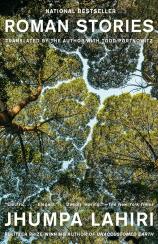Roman Stories
Review
Roman Stories
Jhumpa Lahiri doesn’t like to do the same thing all the time. Like one of her great Italian literary heroes, Alberto Moravia, she decided --- after collections of short stories and introspective novels about the immigrant experience --- to move to Rome. There she studied the language and lifestyle of modern Italians and gave herself a new goal: to write only in Italian and then translate from there to reach her reading public around the globe.
ROMAN STORIES, a collection of nine perfect stories, is her first output from this grand experiment. It is a quiet explosion of a book that takes small moments and shows their underbelly when least expected. Like modern life itself, Lahiri is straddling two worlds --- one good, one difficult --- and her characters and their upheavals are both matter of fact and highly emotional. Her experiment is a massive success.
"Lahiri has always had the utmost control over her prose.... Her stories work on the basis that they seem simple, but the punch they pack will follow you well past the last page. ROMAN STORIES is a knockout in any language."
The first story, “The Boundary,” is narrated by a young woman who lives with her father and attends to the tourists who come to rent the cottage next door. She shows the mother of one family where everything is and watches with a wary eye the goings-on of the father and their two daughters, along with their friends who come to visit. Her own immigrant experience and the life led with her parents when she was young becomes the viewer through which her present situation is given perspective. The little girls she watches have no idea about the kind of life she has managed to survive. There are deep immigrant wounds here, and the class differentiation between the two families is a gently painful reminder of the schisms between the haves and the have-nots anywhere in the world.
Lahiri loves Rome and its environs, for better and for worse. Like Roberto Rossellini’s films about the painful legacies of Italy within the framework of the world wars, she takes into consideration and has particular pathos for those who live below the norm, the struggling families, and the men and women looking only to survive as opposed to thrive. She digs deep, like a paleontologist, unleashing from old soil a concrete reminder of the pains of the past and how they continue to affront and define the present for so many humans. In “The Steps,” which is set on the Spanish steps, wasted youth takes its toll on an artist who only wants to see a romantic history. She is not afraid to highlight the squalid parts of the historic landscape as well as those that march to a more modern tune.
Lahiri’s characters are plainspoken, meaning that they don’t put on airs. In “P’s Parties,” a husband and wife speak in short, clipped sentences to each other, belying the layers of emotional pain they are experiencing, while attempting to maintain the perfect life of an Instagram influencer. The stories have been translated from the Italian by Lahiri herself and Knopf editor Todd Portnowitz, and they buzz with the vitality of considered, specific prose and dialogue. It is not hard to imagine these tales being made into a cinematic anthology where the backdrop of Rome and its surroundings enhance the deep emotional realms of these investigations.
Lahiri has always had the utmost control over her prose. These pieces zing along quite rapidly, but they leave you reeling as you begin to think about them and uncover all the layers of generational need, hope, love, anger, honor and… the list goes on. Her stories work on the basis that they seem simple, but the punch they pack will follow you well past the last page. ROMAN STORIES is a knockout in any language.
Reviewed by Jana Siciliano on October 20, 2023
Roman Stories
- Publication Date: June 18, 2024
- Genres: Fiction, Short Stories, Women's Fiction
- Paperback: 224 pages
- Publisher: Vintage
- ISBN-10: 0593469909
- ISBN-13: 9780593469903





